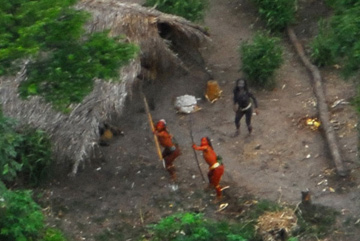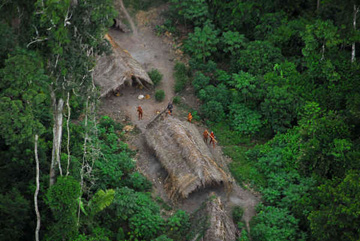Peru’s uncontacted Amazon tribes under attack
mongabay.com
October 22, 2008
Illegal logging in the Peruvian Amazon is driving uncontacted tribes into Brazil where they are in conflict over food and resources with other uncontacted groups, according to a Reuters interview with a leading expert on indigenous tribes.
Jose Meirelles of Brazil’s Indian affairs agency FUNAI told Reuters he was seeing evidence of uncontacted tribes fleeing loggers in Peru.
“Putting it simply, the loggers are killing and expelling the isolated people. It’s clear that they (the Indians) are coming here,” Meirelles told Reuters from Brazil.
As the Indians flee they move into territories controlled by other tribes, resulting in conflict.
“On one side they are persecuted and killed by loggers and when they flee they come into conflict with rival isolated tribes. So they have to keep looking for space where they can feed themselves,” added Beatriz Huertas, an representative for CIPIACI — an indigenous rights group — who spent three weeks in the border area in June.
Last month Meirelles and a colleague were attacked with arrows by a group of Indians. He said the arrows and the cut of the hair did not match the three known groups on the Brazilian side, indicating that Indians are indeed crossing the border.
  Photos of an uncontacted tribe in the Terra Indigena Kampa e Isolados do Envira, Acre state, Brazil, near the border with Peru, caused a stir when they were released by Survival International, an NGO, in May 2008. The indigenous group is said to be threatened by oil exploration in the area. © Gleison Miranda/FUNAI. |
The attack took place in the Brazilian state of Acre near where a band of uncontacted Indians were photographed with dyed skin and wielding bows and arrows. The photos stirred a media frenzy when released in May by Brazilian authorities who hoped the attention would pressure Peru to better protect indigenous groups from loggers in the region.
Brazil also has difficulty protecting Indians from illegal loggers, miners, and bounty hunters hired by developers aiming to clear land for cattle pasture and farms. FUNAI works to protect the country’s 26 confirmed native tribes that live with little to no contact with the outside world, but monitoring and enforcement are difficult in the expansive and remote region. Further because uncontacted rainforest tribes rarely erect permanent structures or live in groups much large than a couple dozen people, detecting them — let alone protecting them — is a challenge.
Peru has been under fire recently for accelerating deforestation rates as well as a massive expansion in the area under concession for oil and gas development. A recent study showed that 72 percent of the Peruvian Amazon — including designated indiegenous territories — is now controlled by energy companies.
“The (Peruvian) government has made it very clear that it wants to open up large parts of the Amazon — it’s done that for oil and gas,” David Hill of Survival International, a group that campaigns for indigenous groups, told Retueres. “In this case there is a logging problem in all kinds of areas where it shouldn’t be happening and it’s failing to do anything about it.”
Stuart Grudgings. Peru Accused Of Failing To Protect Amazon Tribes. Reuters October 20, 2008